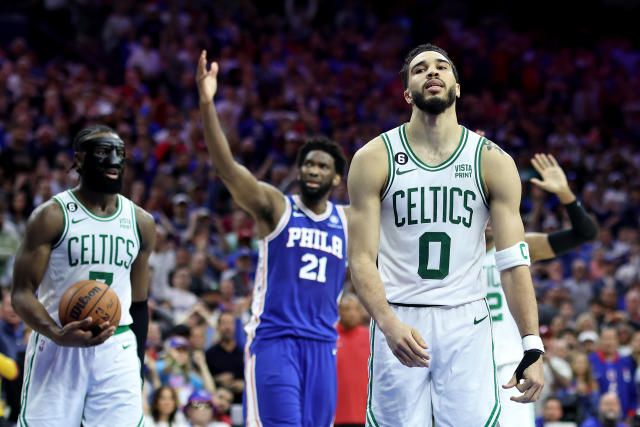Not Smart, Celtics lose in OT
The Celtics and 76ers went at it for 53 minutes on Sunday, but it was poor decisions in the last twenty seconds that cost Boston the game.

The Celtics and 76ers went at it for 53 minutes on Sunday, but it was poor decisions in the last twenty seconds that cost Boston the game.
The Celtics made a valiant comeback on the road, With two minutes left in the third quarter, the Celtics trailed Philly by 15. After Joel Embiid (34 points, 13 rebounds) made a layup with 7:15 to go in regulation, Celtics head coach Joe Mazzulla made good use of his timeouts by calling one as the Philadelphia crowd was being whipped into a frenzy. The Celtics responded with a 10-0 run, exclaimed by a thunderous dunk by Al Horford driving down the middle of the lane. It would be the last timeout Mazzulla would use, which would later become the story of the game.
Marcus Smart would have a great look at a three-pointer as time expired in regulation with the score tied, but his shot came up short.
Philadelphia would take the lead, 116-115, with 19 seconds left in overtime, when James Harden was left all alone in the right corner and drained a three-pointer. His defender, Jaylen Brown, left him alone in the corner as he tried to sneak up behind Embiid as Embiid drove to the rim. Brown tried to recover when Embiid kicked the ball out to Harden, but he was too late getting there.
Brown, to his credit, took responsibility for his blunder after the game. “Just a bad read,” Brown said. “That’s it. It’s a gamble at the wrong time. Big shot by James Harden but that’s my fault. I take full accountability.”
But the Celtics still had time to compose themselves and draw up a play for one of their two superstars to close out the game. Instead, Mazzulla chose not to call a timeout and, instead, let his players play out the final seconds on their own. When Smart again wound up with the ball in his hands as time expired, his shot went through the net, but it left his hands after the buzzer.
Tatum had the ball in the final seconds, but began his drive to the basket too late, then kicked the ball out to Smart with too little time for Smart to catch and shoot. Could a timeout have helped to remind the players of how to manage the clock at the end? What is the point of having two timeouts, which commentator Doris Burke said Mazzulla likes to save for the end of the game? The Celtics should have gotten a shot off with at least three or four seconds left on the clock in case of a miss. The Celtics would then either have time to put back an offensive rebound or the chance to foul, use their other timeout after the Philadelphia free throws and set up a play from a half court inbounds. Instead of having two shots to either win or extend the game, the Celtics were unable to get off even one shot.
It comes as no surprise, however, that Mazzulla didn’t use his timeout. It is what he has done all season. He likes to trust his players to play through opponents’ runs. At least he is consistent.
“That was the play, we just had to play with a little more pace,” Mazzulla said after the game when asked about the last play. “We had the right matchup. Jayson got downhill, made the right play at the rim, we just had to play with a bit more pace there. But that was the play.”
Well, guess what? If the team needed to play with a little more pace, maybe a timeout to tell the team that may have helped. And why did the ball end up twice in the worst Celtics' three-point shooter on the court's hands as time expired?
Jaylen Brown, as he did in Boston’s other loss in the series, disappeared in the second half after a hot start. Tatum, who likes to think of himself as the team’s superstar, decided against challenging league MVP Embiid on that final play and, instead, chose to defer to last year’s defensive player of the year, Marcus Smart, with no time left on the clock.
This is not the 1986 Celtics we are talking about here. Tatum, Brown, Derek White, Horford, and Smart are not Bird, McHale, Parish, DJ, and Walton. This current mix of Celtics hasn’t won anything and doesn’t deserve to be given that responsibility.
Mazzulla says the team ran the play they wanted at the end of overtime. Is that the only play Mazzulla has in his bag at the end of games, because it looked an awful lot like the one at the end of regulation? Smart brings the ball up court, gives it to Tatum, Tatum takes it to the hoop, gets confronted by Embiid, and kicks it back to Smart.
Jaylen Brown, arguably the team’s second best scorer, never touched the ball on either possession. After the game, Brown said he should probably start demanding the ball more. Or maybe Mazzula should be drawing up plays for Brown more? There’s a thought.
In Game 1, Marcus Smart was mic’d up and ran, dismissively, right past his coach and onto the court, subbing himself into the game, declaring, “Hey, put me in for JB.” Smart could also be heard switching up the defensive matchups – all jobs the head coach should be doing.
In his postgame press conference after a Celtics' victory in Game 2, Mazzulla showed his immaturity by ending the session gloating, as he walked away, “What, no one wants to ask me about the adjustments we made from Game 1 to Game 2?”
Mazzulla ended a Zoom call with reporters last Thursday, saying, “I am the worst coach ever” as he turned to walk away. Whether he was mocking the press’ criticisms of him, or being self-deprecating, it is not a good look.
If the Celtics are to win the championship this year, they will have to do it despite their head coach. In time, Mazzulla may become a good coach, but, right now, the stage is too big for him.

